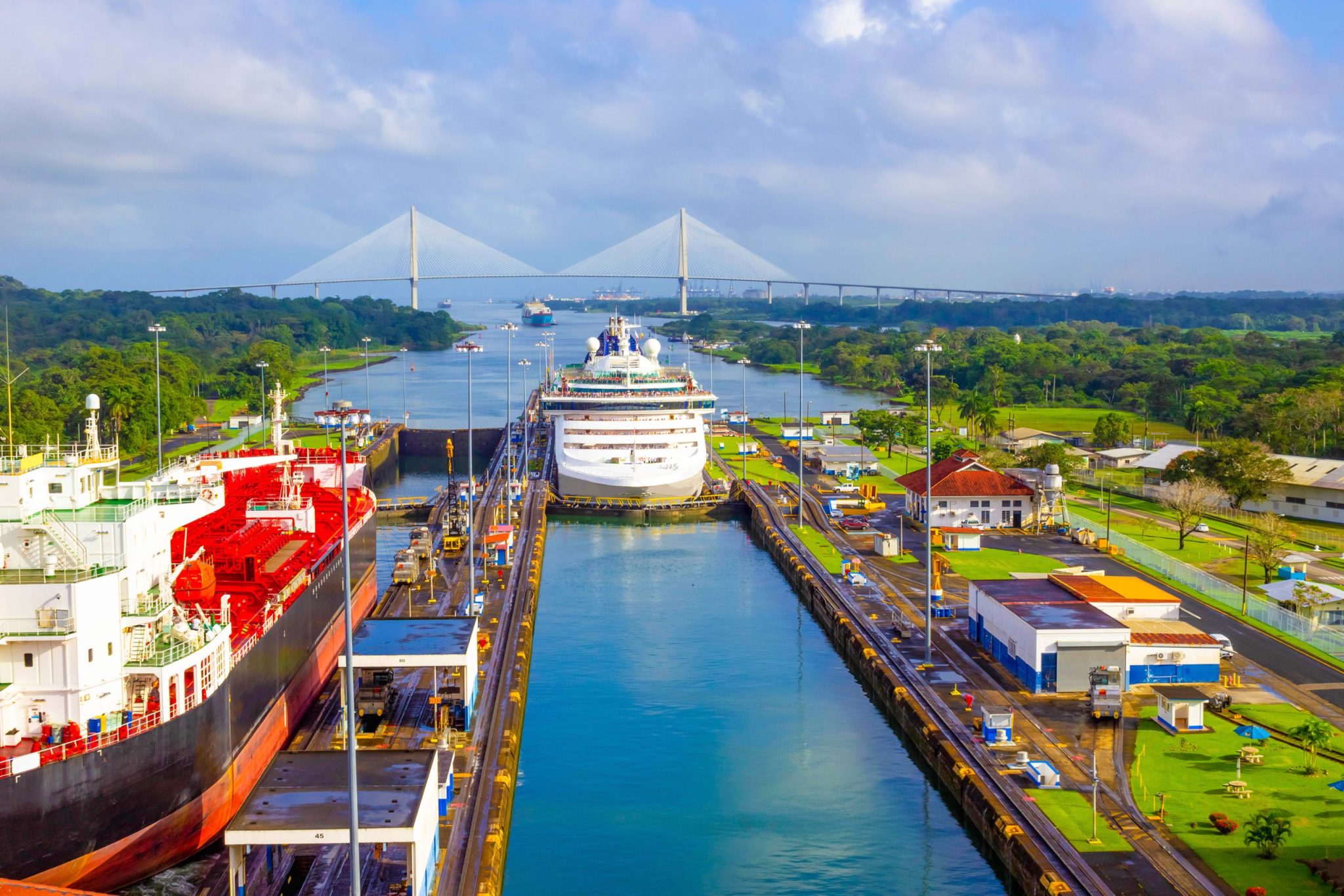On December 21, 2024, then-US President-elect Donald Trump demanded that the Panama Canal be returned to the United States from Panama if the latter continued to charge US vessels what he described as “exorbitant” and “ridiculous” rates. A day later, he decried growing Chinese influence and control over the waterway. Then, on the day of his inauguration, he vowed to return it to American hands. What Trump may not have intended is that his pronouncements on the canal provided an opportunity for US adversaries to strengthen their relationships in Panama and, more broadly, in Latin America. This is apparent in the official messaging from Russia and China, which have consistently exploited real or perceived grievances towards the United States to expand their influence in the region.
Trump’s commentary drew reactions of concern and befuddlement, including from allies, but Russia and China’s diplomats and state media, including influential outlets targeting Latin American audiences, also leveraged the situation to advance their geopolitical agendas and longstanding narratives about the United States and the international order.
Using ASD’s Hamilton 2.0 Dashboard, we analyzed the coverage of Russian and Chinese state media, diplomatic, and state-affiliated accounts across multiple social media platforms in the weeks following Trump’s initial statements about the Panama Canal. In their communications, Russia and China maintained that the United States is acting as an imperialist power with disregard for international law, with Russia criticizing what it sees as US hypocrisy over the norm of territorial sovereignty and China positioning itself as a more reliable partner to Latin America and the so-called “Global South”.
Russia
Russian state media, diplomats, and affiliated accounts have cudgeled the United States for its alleged imperialist tendencies, while emphasizing to diverse audiences, including in the Spanish language in Latin America, that there are alternatives to US hegemony. Russian official messaging presented Trump’s statements about reclaiming the Panama Canal—as well as acquiring Greenland and annexing Canada—as emblematic of a broader historical pattern of US territorial expansion and disregard for international norms. Russia also framed Trump’s posture as a continuation of 19th-century US foreign policy and “aiming to obscure the US and NATO’s defeat in Europe”.
Trump’s comments about renaming the Gulf of Mexico or treating territorial acquisitions as personal or corporate transactions have been regarded as a “joke”. This contributes to a broader theme of mocking US leadership, with figures like former Russian President Dmitry Medvedev suggesting sarcastically that Trump and Elon Musk “should acquire these territories as private properties”. The not-so-hidden implication is that the unpredictability and transactional nature of US policymaking means the United States lacks reliable and rational leadership.
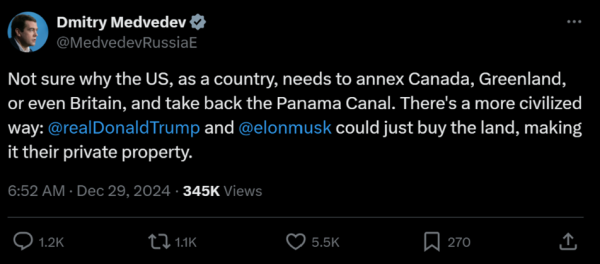
A post from Dmitry Medvedev on X, published December 29, 2024
Russian narratives have also highlighted international backlash to Trump’s statements. Russian state media outlets targeting Spanish-speaking audiences, such as RT en Español and Sputnik Mundo, highlighted the backlash from Panamanian President José Raúl Mulino and other Panamanian officials, Colombian President Gustavo Petro, and German Chancellor Olaf Scholz to illustrate global opposition to Trump’s plans. RT en Español and other outlets also framed Latin American countries’ expressions of solidarity with Panama as a collective resistance to neocolonial ambitions, bolstering the narrative of widespread discontent with US foreign policy.
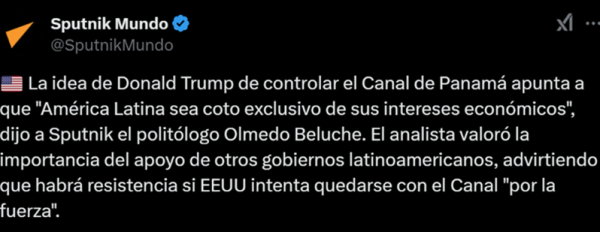
A post from Sputnik Mundo on X, published December 25, 2024
US-China tensions, particularly over the Panama Canal, are leveraged for this end, too. Russian state media has positioned China as a challenger to US dominance, acknowledging China’s ownership of several ports around the canal, while presenting Russia as a neutral observer that advocates for stability and adherence to international law. This portrayal advances Russia’s broader concept of a multipolar world, where US unilateralism faces growing resistance from various global actors. Sputnik Brazil, for instance, quoted Professor José Niemeyer of Ibmec, a Brazilian university, to advance the idea that, purportedly, the Panama Canal will gain strategic importance by facilitating Chinese-Russian trade partnerships, turning China into a reliable partner and Russia into an arbiter of a new, complex world.
Russian state media also drew parallels between Trump’s expansionist rhetoric and Russia’s war in Ukraine, contending that the United States gifted Russia (and China) the best excuse. They have also implicitly painted the United States as hypocritical for condemning Russia for its war of aggression against Ukraine while favoring its own expansionist agenda. By framing Trump’s statements as reflective of imperialist ambitions, Russian state media implicitly normalizes or justifies its own government’s actions as consistent with the practices of major powers. Additionally, Trump’s focus on strategic assets like the Panama Canal and economic policies like tariffs on Canada and Mexico are characterized as aggressive and destabilizing, in contrast to Russia’s supposed advocacy for economic stability and neutrality in critical regions.
China
Chinese state media and diplomats amplified President Mulino’s response to Trump that Panama would continue to own the canal in multiple languages, including Spanish and Arabic. Notably, the nationalist tabloid Global Times amplified Mulino’s rebuttal of Trump’s allegation that Chinese soldiers “illegally operate” the canal, to which the Panamanian president responded that there is “absolutely no Chinese interference” there. Diplomatic and state media sources also rejected Trump’s remark that China takes part in operating the canal. However, Chinese messaging largely opted to focus attention on other topics.
Chinese state media and diplomats amplified messages of solidarity with Panama from other Latin American countries, such as Mexico, Chile, and Venezuela, former regional officials, and a regional intergovernmental bloc. They also conveyed Beijing’s support for Panamanian sovereignty and commemorated the 25th anniversary of Panama regaining control of the canal. Chinese narratives portrayed the United States as a colonial or imperialist power in Latin America, invoking historical tensions in the US relationship with the region, and framed Beijing as a benevolent alternative. Chinese state media, including Xinhua’s Spanish-language service, noted Panamanians’ view of the canal as a symbol of independence and national identity and blamed 20th-century US intervention in Panama for negative economic ramifications and for the suppression of the 1964 protests against the US presence in Panama. The Global Times further condemned the United States for being “immersed in its backyard nostalgia”, denying Latin American countries “sovereignty, respect, and a more just and equitable international order”, and called Mulino’s response to Trump a sign of the end of “unchecked hegemony”. CGTN Russian interviewed a Russian professor who cited the Monroe Doctrine as providing the rationale behind Trump’s policies. Against this backdrop, CGTN Español called US-Latin American relations “close but unequal” and stressed the need for Latin American countries to balance relations between the United States and China. The Global Times further claimed that China’s interest in the region, supposedly unlike the United States’, is driven by “mutual interests”. This messaging helps to build a narrative that China will prove a more agreeable partner to the region.
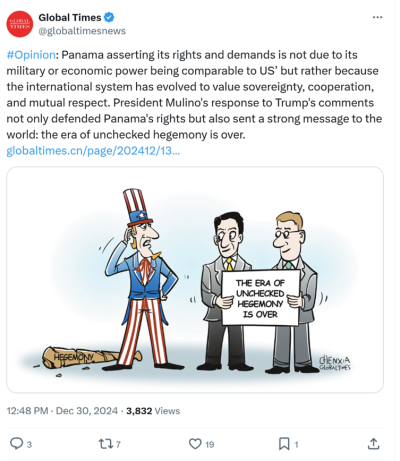
A post from the Global Times on X, published December 30, 2024
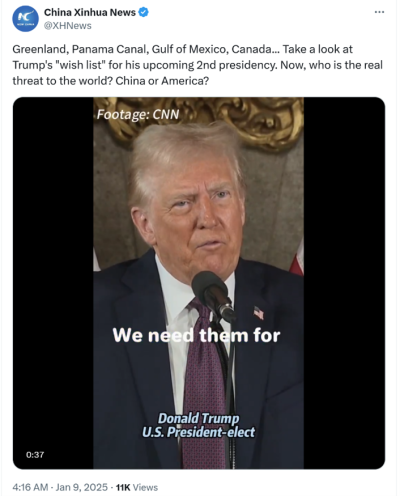
A post from China Xinhua News on X, published January 9, 2025
In some cases, Chinese state media portrayed the United States as erratic. On YouTube, Telegram and X, Xinhua listed the Panama Canal, Greenland, the Gulf of Mexico, and Canada as items on Trump’s “wish list” and asked: “Who is the real threat to the world? China or America?” Phoenix TV continued the narrative, asking if the United States is an “international policeman” or “international hooligan”. The Global Times warned that potential US economic coercion or the use of military force to annex the Panama Canal, Greenland, or Canada would “set a dangerous precedent” for countries to disregard international law, echoing themes seen in Russian state media.
Losing the Narrative War?
Russian and Chinese messaging underscore a strategic effort to reshape global perceptions of the United States. Moscow and Beijing seek to erode Washington’s international credibility, particularly in Latin America, where both countries have expanded their political, economic, and informational influence to varying degrees, and stress that the United States will be hard pressed to find international backing for its stances on the canal. Both countries also exploit these narratives to promote a multipolar world order, where US leadership is diminished and Latin American countries—and those from other regions in the “Global South”—are encouraged to distance themselves from Washington.
The narratives that both countries promote clearly advance their national interests. Russia has long complained of Western hypocrisy or double standards about territorial expansion or the use of force and has characterized the United States as a destabilizing force with little regard for international law. China, meanwhile, aims to deflect discussion of its influence on the canal, present itself as a benevolent partner abroad, and supplant US influence in Latin America. Furthermore, Russia and China have exploited genuine local sentiments about sovereignty and independence for their own, less altruistic purposes, in part with the aid of their influential Spanish-language outlets.
Trump’s hard line toward Panama may simply be a negotiating tactic to extract concessions on US national security issues, including Chinese port ownership around the canal, but they could also encourage Latin American leaders and publics to pursue alternatives to US leadership. China and Russia eagerly promote this vision. In fact, China has already made significant headway in the case of Panama, which already withdrew its recognition of Taiwan in 2017 and became the first Latin American country to join Beijing’s Belt and Road Initiative in 2018, although it appears Panama will not renew the latter agreement amid US pressure. If trends like this continue, the United States could win the battle for specific policies but lose the narrative war. In this case, expect Russian and Chinese official communications in the region to be an active vessel to channel their frustrations once again.
The views expressed in GMF publications and commentary are the views of the author alone.

